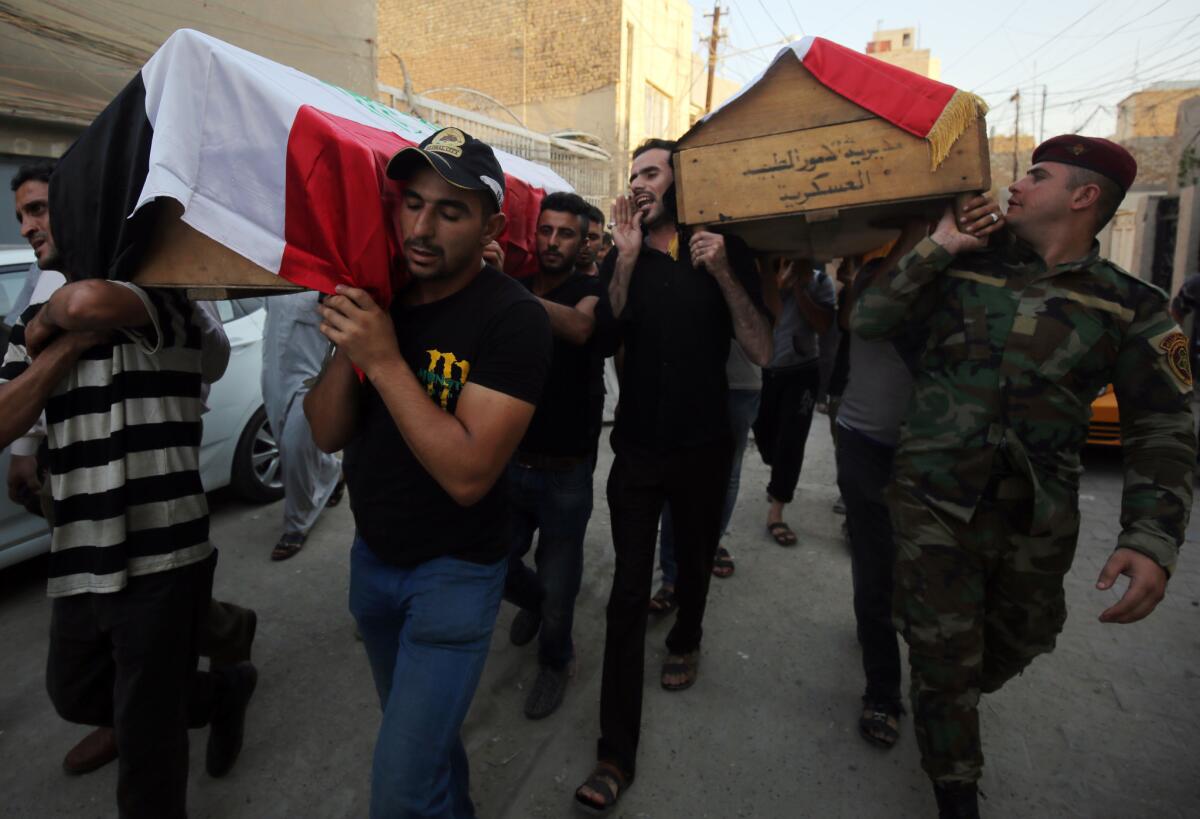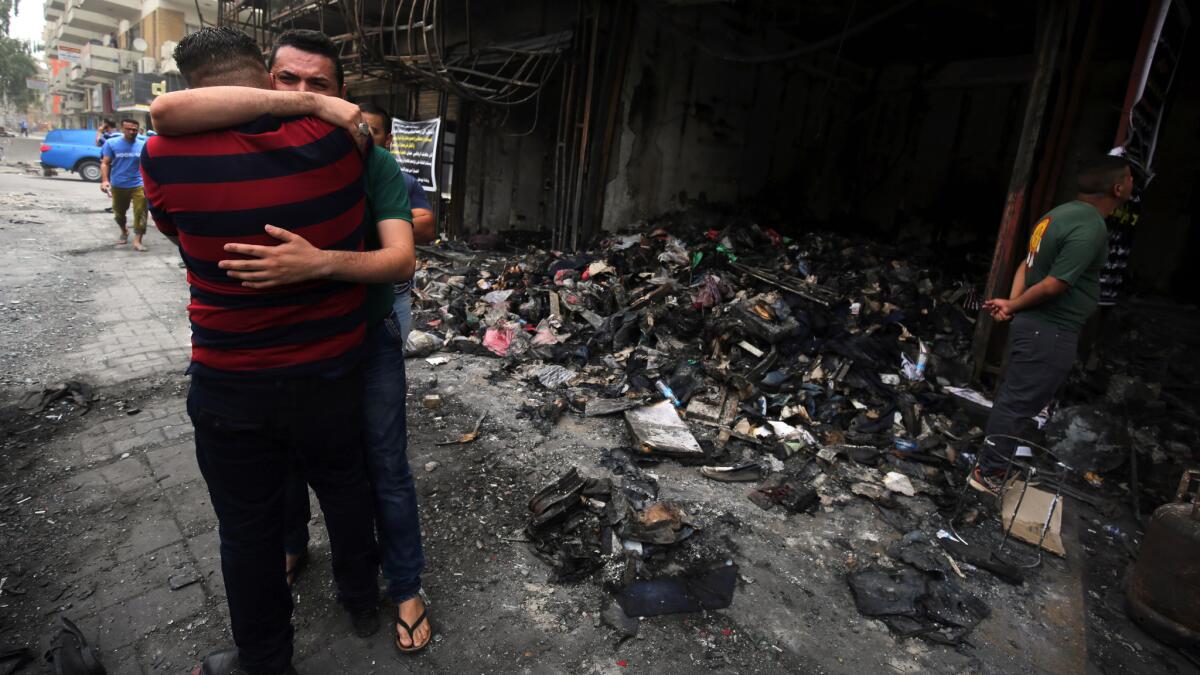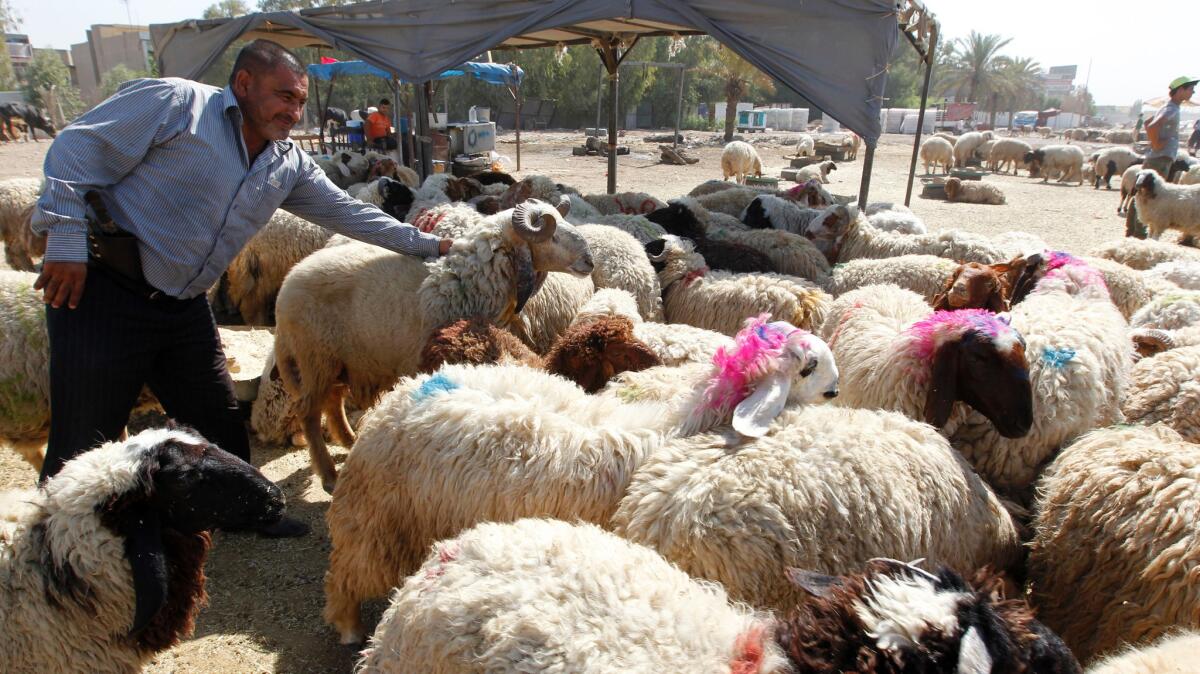Bombed and beleaguered, a Baghdad neighborhood takes stock on a key Muslim holiday

- Share via
Reporting from Baghdad — Kathem Hussein fondly remembers the year that he made more than $4,000 on the Day of Arafah, the holiest day on the Muslim calendar. This year, Hussein, a street vendor of men’s shoes, expected no such windfall.
“We’ve had some customers, some signs of life, but nothing like we should be having,” he said Sunday as he eyed a young man scowling intently at a pair of brown loafers. “The government isn’t able to protect us here, so people aren’t coming.”
Hussein works in the Baghdad neighborhood of Karada, a relatively affluent Shiite enclave that would ordinarily be bustling on this day, which comes on the eve of the holiday of Eid al-Adha — the Festival of the Sacrifice.
But in the aftermath of an Islamic State suicide bombing in July that killed more than 320 people — one of the deadliest attacks on civilians since the U.S. invasion in 2003 -- Karada has yet to recover.

A trip down a Karada sidewalk is normally a gantlet of juice stands, barbecue joints replete with dangling carcasses, and dozens of pop-up stores hawking such wares as children’s toys and knock-off razors; traffic usually slows to a crawl on its two-sided thoroughfare.
But the attack, which came days before another major Muslim holiday, Eid al-Fitr (the Festival of Breaking the Fast), pushed authorities to close Karada to street traffic, crippling business in the area. Karada has often been a target for Islamic State precisely because it usually draws large crowds. The extremist group considers the Shiites who populate the neighborhood to be apostates who must be killed.
The government also withdrew the plastic “wands,” boxes with antennas that were intended to find bombs but that had been widely discredited as fakes. Instead, it installed a large mobile scanner that could sweep an entire vehicle for explosives.
Yet that proved ineffective as well: When Karada was finally reopened, police were forced to shut it down again last week after a suicide bomber detonated a pickup truck loaded with explosives not far from the site of July’s bombing. The attack killed nine people and wounded 20 others.
That first explosion in July, this is what destroyed us. And that second attack finished it.
— Abu Christian Hewa, an employee at a beauty supply shop
Instead of customers crowding into shops and cafes, employees now sit torpidly in the heat, waiting for someone to drop by. So empty are the streets that children use them to play soccer, their games interrupted only by the dozen or so buses allowed to ferry passengers inside Karada.
“That first explosion in July, this is what destroyed us. And that second attack finished it. There is now fear of coming here,” said Abu Christian Hewa, an employee at a beauty supply shop off one of the many side streets now blocked by concrete barriers.
“Without cars, who is going to walk here in this heat? It’s better if I go home and sleep these next two months instead of working.”
The attacks, Hewa explained, both staged a few days before the two major Muslim holidays, had effectively wiped out any benefit those festivals normally bring to traders.

Shamoun Hermis, the owner of a fast-food restaurant called Al-Nour, agreed.
“I pay per month 5 million dinars rent, 1.5 million dinars for electricity, and I barely made 100,000 dinars today. It’s barely enough to cover the salary of my workers,” Hermis said in an interview. Those figures are roughly the equivalent of $4,300 for rent, $1,300 for electricity and $85 in income.
He pointed inside to a recently renovated wing of his restaurant meant to accommodate families.
“We haven’t had even one family walk in here today. And this is supposed to be Eid,” he added.
For many, the bombings’ aftermath, with funerals and ceremonies honoring the dead, have muted the sense of celebration.
“We don’t feel like it’s Eid for us here. It’s not even a week since the last bomb, and there is still mourning of the people from the attack in July who were friends and brothers to us,” said Mayadah Obaidi, a Karada resident who had recently fled the northern Iraqi city of Mosul, which was captured by Islamic State in a blitzkrieg offensive in 2014.
Walking alongside her was her daughter, clutching a small shopping bag.
“We decided to come out and do some shopping just to feel better, but really, this is not a happy season,” Obaidi continued.
“What happened here, these two bombings, they left no happiness for any one,” she said.
Bulos is a special correspondent.
ALSO:
U.S.-Russia deal on Syria will test influence of big powers, convictions of those on the ground
The Marines wouldn’t take him. So Levi Shirley went to war on his own
U.S. slams Netanyahu after he equates opposition to Israeli settlements with ‘ethnic cleansing’
More to Read
Sign up for Essential California
The most important California stories and recommendations in your inbox every morning.
You may occasionally receive promotional content from the Los Angeles Times.










